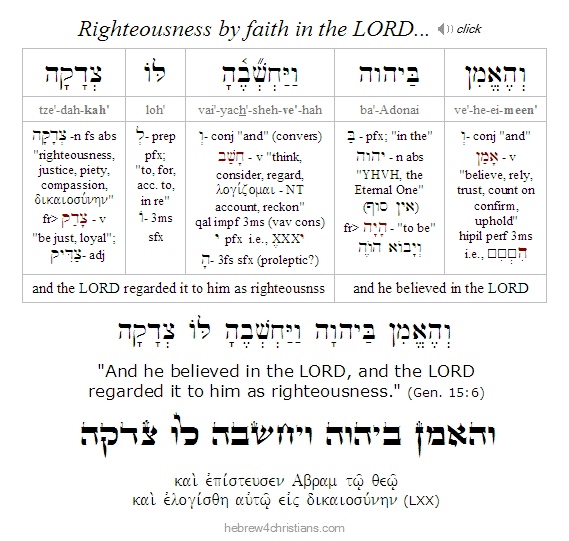|
|
|||||||||||||||||||||
 |
|||||||||||||||||||||
 |
|||||||||||||||||||||
|
|
||||||||||||||||||||||||||||
|
Our Torah portion this week describes how Abram was declared righteous because he trusted in God's promise for his life. The Hebrew word emunah (אֱמוּנָה), often rendered as "faith" in many English translations, comes from the root word aman (אָמַן), which means to rest securely or rely upon (and from which we also get the word "amen"). The root occurs for the first time in the Torah in connection with Abraham: "And he believed (וְהֶאֱמִן) in the LORD, and He regarded it to him as righteousness" (Gen. 15:6). But what was the nature of Abraham's faith that caused God to regard it as tzedakah (צְדָקָה) or "righteousness"? What was the "object" or "content" of his faith? Was it not that Abram knew the character and will of God so intimately that he unconditionally put his trust in Him? Abraham was declared tzaddik (righteous) because he believed and understood that the LORD would fulfill His promise to him, despite his advanced age and the seeming impossibility of becoming the father of a multitude of nations (for more on this, click here). Abraham affirmed God's promise by saying the first "amen."
"What then shall we say was gained by Abraham, our forefather according to the flesh? For if Abraham was justified by works, he has something to boast about, but not before God. But what does the Scripture say? "Abraham believed God, and it was counted to him as righteousness." Now to the one who works, his wages are not counted as a gift but as his due, but to the one who does not work but believes in him who justifies the ungodly, his faith is counted as righteousness" (Rom. 4:1-5). Note: For more on this subject, see the article, "Emunah and Bittachon." |
|
Hebrew for Christians |
|||||
|
|||||

